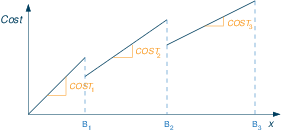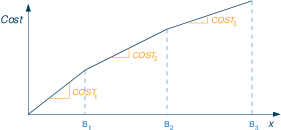Price breaks
All items discount: when buying a certain number of items we get discounts on all items that we buy if the quantity we buy lies in certain price bands.

| less than B1 | COST1 each |
| ≥ B1 and < B2 | COST2 each |
| ≥ B2 and < B3 | COST3 each |
- Define binary variables bi (i=1,2,3), where bi is 1 if we pay a unit cost of COSTi.
- Real decision variables xi represent the number of items bought at price COSTi.
- The quantity bought is given by x= ∑ixpi , with a total price of ∑iCOSTi·xpi
- MIP formulation :
where the variables bi are either defined as binaries, or they form a Special Ordered Set of type 1 (SOS1), where the order is given by the values of the breakpoints Bi.∑i bi = 1 xp1 ≤ B1· b1 Bi-1· bi ≤ xpi ≤ Bi· bi for i=2,3
Incremental pricebreaks: when buying a certain number of items we get discounts incrementally. The unit cost for items between 0 and B1 is C1, items between B1 and B2 cost C2 each, etc.

Formulation with Special Ordered Sets of type 2 (SOS2):
- Associate real valued decision variables wi (i=0,1,2,3) with the quantity break points B0 = 0, B1, B2 and B3.
- Cost break points CBPi (=total cost of buying quantity Bi):
CBP0=0 CBPi = CBPi-1+Ci· (Bi-Bi-1) for i=1,2,3 - Constraint formulation:
where the wi form a SOS2 with reference row coefficients given by the coefficients in the definition of the total amount x.∑iwi=1 TotalCost = ∑i CBPi· wi x = ∑i Bi· wi
For a solution to be valid, at most two of the wi can be non-zero, and if there are two non-zero they must be contiguous, thus defining one of the line segments. - Implementation with Mosel (is_sos2 cannot be used here due to the 0-valued coefficient of w0):
Defx := x = sum(i in 1..3) B(i)*w(i) makesos2(My_Set, union(i in 0..3) {w(i)}, Defx)
Formulation using binaries:
- Define binary variables bi (i=1,2,3), where bi is 1 if we have bought any items at a unit cost of COSTi.
- Real decision variables xi (i=1,..3) for the number of items bought at price COSTi.
- Total amount bought: x = ∑i xi
- Constraint formulation:
(Bi-Bi-1)\cdot bi+1 ≤ xi ≤ (Bi-Bi-1)\cdot bi for i=1,2 x3 ≤ (B3-B2)\cdot b3 b1 ≥ b2 ≥ b3
© 2001-2020 Fair Isaac Corporation. All rights reserved. This documentation is the property of Fair Isaac Corporation (“FICO”). Receipt or possession of this documentation does not convey rights to disclose, reproduce, make derivative works, use, or allow others to use it except solely for internal evaluation purposes to determine whether to purchase a license to the software described in this documentation, or as otherwise set forth in a written software license agreement between you and FICO (or a FICO affiliate). Use of this documentation and the software described in it must conform strictly to the foregoing permitted uses, and no other use is permitted.

